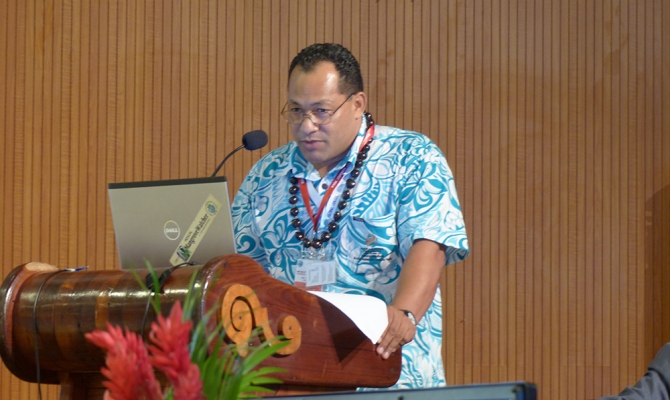
Climate Change Resilience
The Pacific Islands Greenhouse Gas Abatement through Renewable Energy Project (PIGGAREP) was one of several key activities highlighted at Saturday's Renewable Energy Forum in Apia. This event was organised by the Governments of Samoa and New Zealand, and the International Renewable Energy Agency (IRENA) as part of the official pre-conference programme for the third United Nations Conference on Small Island Developing States (SIDS).
Attending the Forum were around 300 SIDS leaders, development partners and stakeholders from around the globe, all gathered together with the explicit task of identifying the elements needed to transform island energy sectors and to discuss how renewable energy is helping many SIDS to achieve sustainable economic development.
Mr Kosi Latu, Deputy Director General of the Secretariat of the Pacific Regional Environment Programme (SPREP) addressed forum delegates in an afternoon session designed to highlight new and innovative renewable energy partnerships and initiatives.

Mr Latu explained that the installation of these systems, which took place in 2011, has had numerous benefits to the local community:
"The residents of Santa Ana have seen tremendous improvements to their quality of life as a result of this project. The community now have ready access to lighting, more money on hand due to fuel cost savings and have even seen benefits to their health as a result of eliminating the use of kerosene. It's a great example of how renewable energy can actually change people's lives for the better."
Another example cited during the presentation was the PIGGAREP-funded feasibility study on the production and use of biofuel on Kiritimati, Kiribati. Based on the results of this feasibility study, the generation of biofuel is now being trialed on the island of Abemama, with a view to extending the initiative to other more remote locations in the future. Mr Latu explains:
"In Kiribati, around 30% of total fuel consumption is used for power generation and the resulting CO2 emissions contribute to climate change and sea level rise. Biofuel is one of the renewable energy technologies seen as feasible, economical and environmentally friendly for use in Kiribati. It has been estimated that through this biofuel project alone, Kiribati will contribute to reducing greenhouse gas emissions by around 479 tons of CO2 per year."
Echoing the comments of many delegates to the forum, Mr Latu emphasised that partnerships between all stakeholders including strong leadership, community ownership, and adequate capacity, frameworks and resources are critical to the success of future renewable initiatives, as is working together to ensure that lessons learned are shared throughout the region and beyond.
PIGGAREP is a Global Environment Facility (GEF) funded regional project being implemented by UNDP (through the UNDP Samoa Multi Country Office) and executed by SPREP.
Attending the Forum were around 300 SIDS leaders, development partners and stakeholders from around the globe, all gathered together with the explicit task of identifying the elements needed to transform island energy sectors and to discuss how renewable energy is helping many SIDS to achieve sustainable economic development.
Mr Kosi Latu, Deputy Director General of the Secretariat of the Pacific Regional Environment Programme (SPREP) addressed forum delegates in an afternoon session designed to highlight new and innovative renewable energy partnerships and initiatives.

Pictured above: SPREP's Deputy Director General, Mr Kosi Latu, addresses the Renewable Energy Forum in Apia.
One of the PIGGAREP activities highlighted during his presentation included the freighting and installation of 50 solar home systems in the Solomon Islands - providing lighting for around 300 residents in the Santa Ana community.Mr Latu explained that the installation of these systems, which took place in 2011, has had numerous benefits to the local community:
"The residents of Santa Ana have seen tremendous improvements to their quality of life as a result of this project. The community now have ready access to lighting, more money on hand due to fuel cost savings and have even seen benefits to their health as a result of eliminating the use of kerosene. It's a great example of how renewable energy can actually change people's lives for the better."
Another example cited during the presentation was the PIGGAREP-funded feasibility study on the production and use of biofuel on Kiritimati, Kiribati. Based on the results of this feasibility study, the generation of biofuel is now being trialed on the island of Abemama, with a view to extending the initiative to other more remote locations in the future. Mr Latu explains:
"In Kiribati, around 30% of total fuel consumption is used for power generation and the resulting CO2 emissions contribute to climate change and sea level rise. Biofuel is one of the renewable energy technologies seen as feasible, economical and environmentally friendly for use in Kiribati. It has been estimated that through this biofuel project alone, Kiribati will contribute to reducing greenhouse gas emissions by around 479 tons of CO2 per year."
Echoing the comments of many delegates to the forum, Mr Latu emphasised that partnerships between all stakeholders including strong leadership, community ownership, and adequate capacity, frameworks and resources are critical to the success of future renewable initiatives, as is working together to ensure that lessons learned are shared throughout the region and beyond.
PIGGAREP is a Global Environment Facility (GEF) funded regional project being implemented by UNDP (through the UNDP Samoa Multi Country Office) and executed by SPREP.